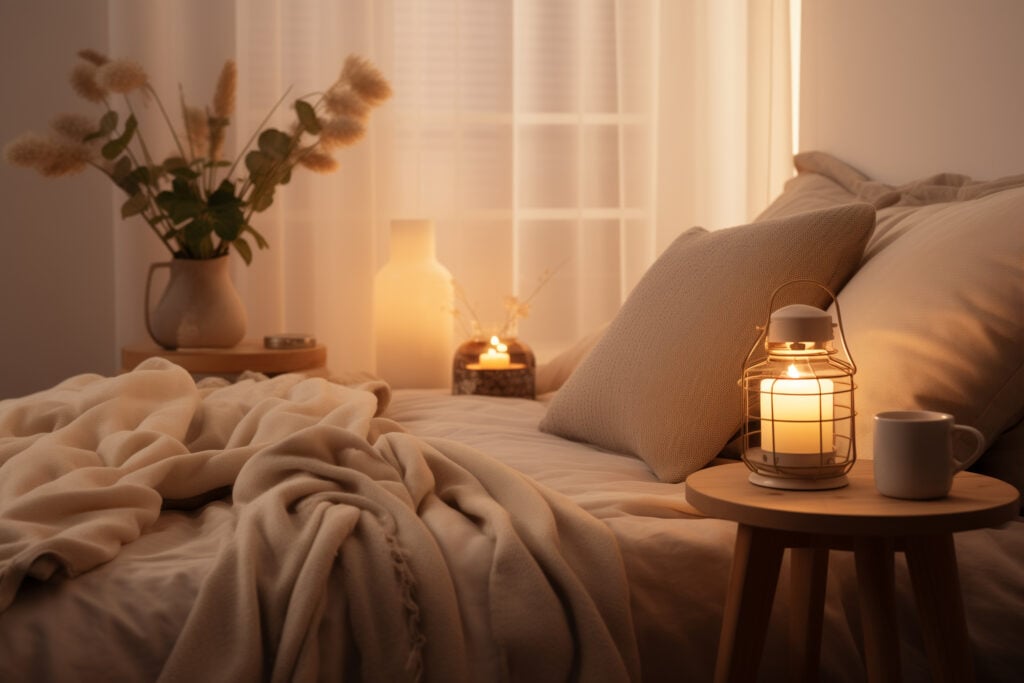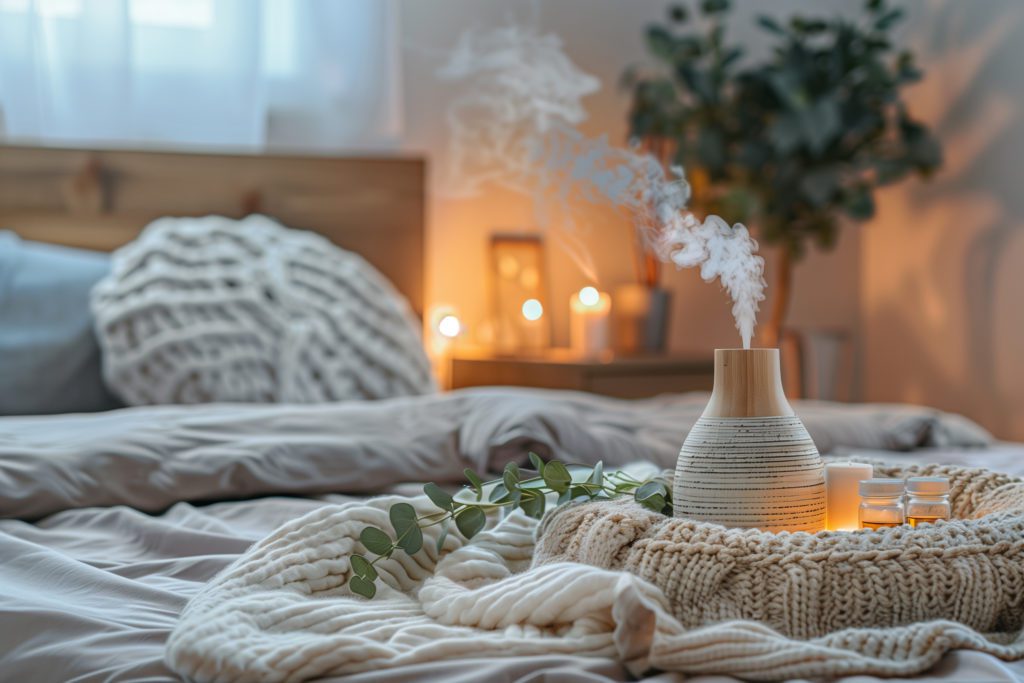
Tips on How to Optimize Your Bedroom for Better Sleep
Learn more about how to optimize your bedroom for better sleep. From noise reduction to screen avoidance, create the ideal sleep environment for optimal rest!

Getting better sleep is not always about having the best mattress but rather understanding how to optimize your bedroom to get the best sleep. It's a combination of factors, and people often get confused about what they should be adjusting to get the best sleep possible. Fortunately, we have all the information you need to create the perfect sleep environment so that your nightly rest is always more than adequate.
In this article, we'll explore some essential tips for optimizing your bedroom for better sleep, including quieting down your environment, avoiding screen time, and ensuring you have the right bedroom temperature. By the end of this article, you'll know everything you need to know to make the best bedroom setting possible, so you get great rest every night.
Opt for a Quiet Bedroom Environment
The first and most important tip is to avoid noise pollution and opt for a quieter bedroom setting. People often do not realize that sleeping with the TV or music on can disrupt their sleep more than they imagine. Disruptive noises can be a real challenge and limit the beneficial deep sleep that people often strive for, shortening or even eliminating crucial REM sleep cycles.
If you find yourself struggling with getting enough sleep and need something in the background, white noise is a great short-term solution for masking other sources of noise. However, continuous noise, just like unexpected, shorter instances of noise, can be just as harmful to your sleep. White noise should only be used in situations where you must get sleep while you find other alternative options to ensure you have a quieter environment for your rest.
The optimal setting for getting enough sleep requires ensuring that you have a quiet environment free from distractions, unexpected noises, or anything that could potentially wake you up from your deep sleep. If necessary, you can get soundproof curtains, shut the doors, or even wear earplugs when you go to bed to shut out the noise and cuddle in for some great shut-eye.
Avoid Screens Before Bed
One of the most difficult habits people have to break to truly experience a better bedroom environment is limiting screen time. To truly optimize the bedroom for better sleep, it's recommended that people avoid screens at all before bed. Blue light is the primary reason for this because it signals to the brain that you should be awake and alert, which can often lead to significant problems in terms of feeling rested and ready for sleep.
One study demonstrated that screen time can delay bedtime 90% of the time and decrease the total sleep time. This leads to significant health consequences, especially for children and adolescents, who can experience significantly damaging long-term effects and conditions that they have to deal with. That's why it's so essential to avoid screens, but it's not just kids and teens who struggle with this, but also adults (Source: PubMed).
For adults, a study on Flemish adults showed that phone use at night before bed was negatively associated with poor sleep outcomes and did more harm than good, showing how it actually harms one sleep quality and ultimately creates problems later on. So, from kids to adults, screen time is a negative situation that should be avoided before bed. However, the right room temperature is one of the most underrated but critical components of an optimal sleep environment that people often miss completely when curating the perfect bedroom setting.
Ensure Your Room is the Right Temperature
When trying to create the perfect bedroom setting for sleep, many people often miss one of the most critical parts of setting the right environment. It's about having the right temperature in your room to ensure that you get enough sleep and that you're not disrupted by being too hot or cold. Studies have shown this is a significant concern for those looking to improve their sleep quality. One study on lower-income families showed that if the room was too hot or cold, they often lost sleep and felt less rested than others.
Further research demonstrates that the minimum limit designated by the World Health Organization is quite appropriate, generally between 65- 70 degrees Fahrenheit (Source: PubMed). This cooler temperature can encourage you to feel more tired and to really relax underneath the coziness of your sheets. The ideal temperature will differ for everybody, but ultimately, it gives a good guideline for where you can make adjustments to improve your sleep quality.
Regarding humidity in the room, which is also a critical component related to temperature, humidity is to be avoided. It should be limited within the environment to ensure adequate sleep and less congestion upon waking. Many people opt to put a fan in their room for warmer nights or even a space heater if needed for cooler nights, ultimately ensuring that they feel comfortable and get enough sleep. If you follow these guidelines and tips, you can create the ultimate bedroom setting at the right temperature and with the proper airflow to ensure you feel as comfortable as possible.
How Will You Improve Your Bedroom Environment?
Improving your bedroom for sleep is all about what's comfortable for you. Hopefully, the tips provided have shown you that there are many ways to improve your bedroom setting. From ensuring enough airflow to the right temperature and even opting for a quieter environment, you have plenty of options to reduce all the distractions and reasons you may not get enough quality sleep.
To learn more about sleep health and how to improve your quality of rest, check out Pillow today to discover more secrets to quality sleep. Additionally, you can try out our app to monitor your sleep to ensure that no matter what happens, you are always getting the right amount of sleep and feeling your best every morning.
FAQ
How does the presence of electronic devices in the bedroom impact sleep?
Electronic devices emit blue light, which can interfere with the production of melatonin, the hormone responsible for regulating sleep. It's advisable to keep electronic devices out of the bedroom or limit their use before bedtime.
How does clutter in the bedroom affect sleep quality?
A cluttered bedroom can contribute to feelings of stress and anxiety, making it more difficult to relax and fall asleep. Keeping your sleeping environment tidy promotes a sense of calm and can improve sleep quality.
Can a bedroom’s scent influence how quickly you fall asleep?
Yes, calming scents like lavender, chamomile, or sandalwood can promote relaxation and signal to the brain that it’s time to sleep. These scents can be introduced through essential oil diffusers, sprays, or candles.
Are there benefits to using weighted blankets in the bedroom for better sleep?
Weighted blankets provide gentle, even pressure that can reduce anxiety and promote relaxation, aiding in better sleep. They’re particularly beneficial for individuals with insomnia, stress, or sensory processing disorders.
What impact does keeping pets in the bedroom have on sleep quality?
Pets in the bedroom can provide comfort but may also disturb sleep with movement or noise. If pets disrupt your sleep, consider a separate sleeping space for them while keeping them nearby for reassurance.
How important is the position of your bed for restful sleep?
The position of your bed can impact sleep quality. Sleeping with your head facing north is believed to align with Earth's magnetic field, promoting restful sleep, while avoiding positions facing direct doorways reduces disturbances.
Is it better to have a completely dark bedroom or allow some ambient light?
A completely dark bedroom is ideal for sleep, as even small amounts of light can disrupt circadian rhythms. If ambient light is unavoidable, consider using dim red nightlights, as red light is less likely to interfere with sleep.
How does the presence of digital clocks with bright displays impact sleep?
Digital clocks with bright displays can disrupt sleep by emitting light, especially blue light, which suppresses melatonin production. Additionally, frequently checking the time during the night can increase stress and anxiety about sleep. Opting for clocks with dim or red displays, or covering the clock, can minimize these effects.

Written by
Marie Soukup
Marie Soukup is a seasoned copywriter, editor, and Integrative Nutrition Health Coach with a certificate from the Institute of Integrative Nutrition (IIN). With years of experience working with brands across diverse industries, Marie is passionate about holistic health and crafting compelling content.
Download Pillow
Get help
Press & News
Legal
Connect
X (Twitter)
Company
Copyright © Neybox Digital Ltd.


